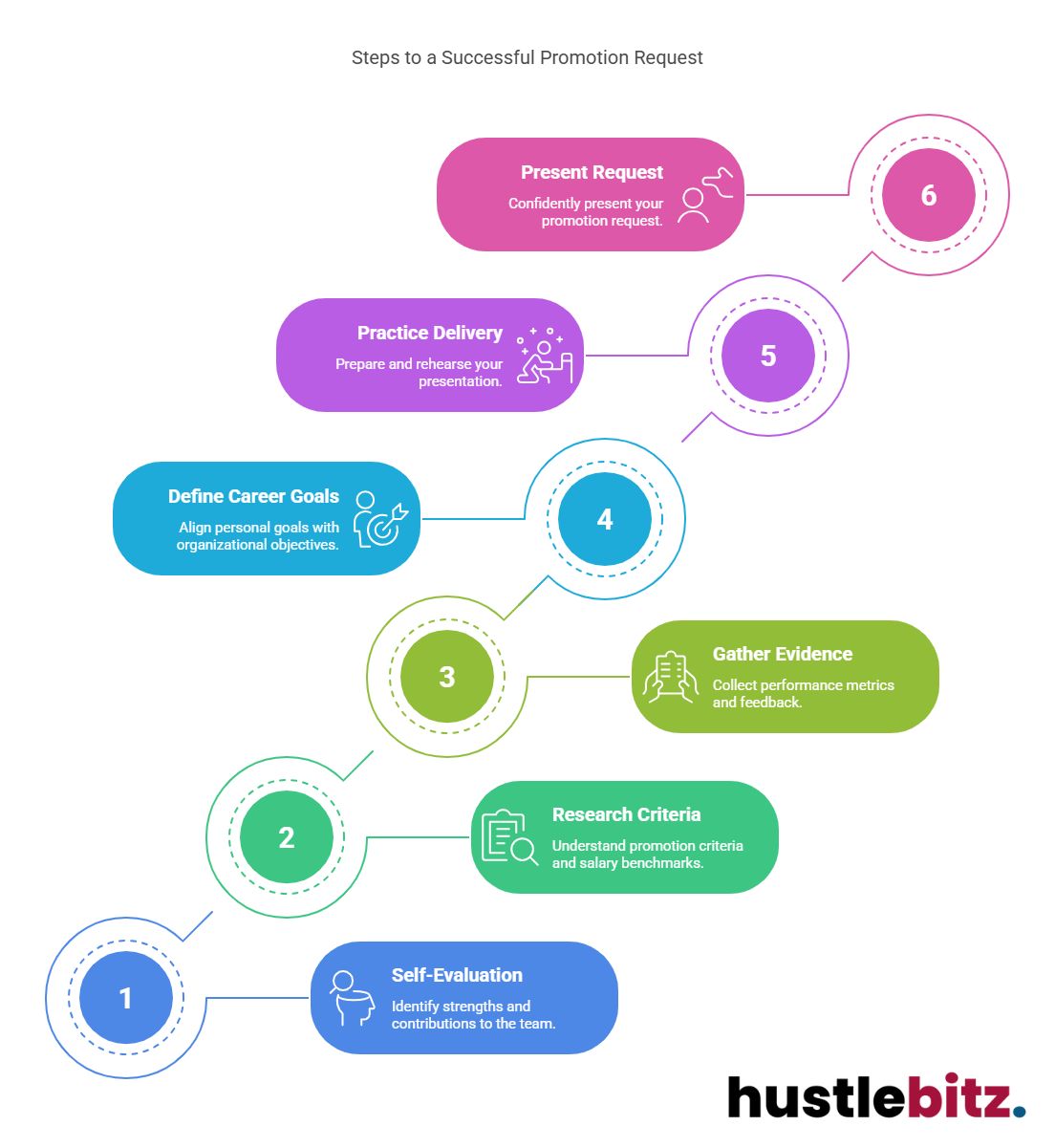To ask for a promotion at work, start by assessing your current situation through self-evaluation and documenting contributions. Research company policies and promotion criteria to understand the necessary qualifications. Identify and highlight specific achievements that align with company goals, gathering supporting evidence like performance metrics and positive feedback. Clearly define your career goals and prepare a compelling pitch that showcases your readiness. Practice your delivery, choose an appropriate time for the discussion, and approach your manager confidently. This strategic combination not only demonstrates your value but also lays the groundwork for a successful promotion discussion ahead.
Key Takeaways
- Conduct a self-evaluation to identify strengths and document contributions that positively impacted the team and workplace satisfaction.
- Research company promotion criteria and salary benchmarks to prepare an informed case for your request.
- Gather supporting evidence of your achievements, including performance metrics and feedback from colleagues and supervisors.
- Define clear career goals that align with organizational objectives, showing your commitment to growth and development.
- Practice your delivery and choose an appropriate time to present your promotion request to your manager confidently.

Assess Your Current Situation

Before initiating a discussion about a promotion, it is essential to thoroughly assess your current situation, including your performance, contributions, and the expectations of your role within the organization. This self-evaluation process is crucial for ensuring that you are aligned with industry standards and can substantiate your request for advancement.
Start by employing self-evaluation methods, which may include reflecting on past performance reviews and identifying key areas where you have excelled. Consider your job responsibilities and how your contributions have positively impacted team dynamics and overall workplace satisfaction. Document specific instances where your skills have contributed to team success, showcasing your commitment to both personal growth and organizational objectives.
Additionally, seek feedback mechanisms from colleagues and supervisors to gain insights into areas for skill development. Constructive feedback can illuminate strengths and highlight areas that may need improvement, thus allowing for a more comprehensive understanding of your standing within the company.
Align your career aspirations with your current role by identifying how your growth can benefit the organization. Demonstrating awareness of your contributions and actively participating in your skill development will not only reinforce your readiness for promotion but also showcase your commitment to continuous improvement.
Ultimately, this thorough assessment will empower you to present a compelling case for your promotion, rooted in tangible evidence of your value and potential within the company.
Research Company Policies

Understanding company policies regarding promotions is crucial for effectively navigating the process and aligning your request with organizational expectations.
Begin by familiarizing yourself with the promotion criteria established by your employer. This often includes specific qualifications, skills, and experiences that are essential for advancement. Reviewing job descriptions for the positions you aspire to will provide clarity on what is expected.
Additionally, investigate salary benchmarks within your organization and industry. Understanding these figures allows you to make informed requests that align with both your worth and the company’s financial framework.
Performance reviews play a significant role in the promotion process; thus, it is vital to understand how your contributions are evaluated and how employee feedback is integrated into decision-making.
Understanding the company’s career pathways and internal mobility options can also enhance your strategy. Familiarize yourself with the organizational structure to identify potential opportunities for growth.
Aligning your professional development with company values not only strengthens your case for promotion but also demonstrates your commitment to the organization’s mission.
Identify Your Achievements

To effectively advocate for a promotion, it is essential to clearly identify and articulate your key achievements and contributions within the organization. Start by engaging in achievement tracking to map out your successes over a specific period. This process involves collecting data related to your performance metrics that demonstrate how you have exceeded expectations in your role.
Consider your project contributions and quantify their impact. For instance, if you led a project that increased revenue or efficiency, highlight these results. Additionally, reflect on your leadership roles, whether in formal capacities or through informal team collaboration. Articulating how you have guided teams or mentored colleagues illustrates your ability to contribute to the organization’s culture and success.
Moreover, emphasize your commitment to skill development, showcasing how you have pursued opportunities for professional growth. This may include attending workshops, obtaining certifications, or taking on challenging assignments that align with your organization’s goals. Incorporating feedback from peers and supervisors can also enhance your narrative by demonstrating your adaptability and willingness to improve.
Ultimately, your achievements should reflect value addition to the organization while aligning with its objectives. Clearly framing your accomplishments in this manner positions you as a proactive employee, making a strong case for why you deserve a promotion.
Gather Supporting Evidence

Collecting supporting evidence is crucial for substantiating your case when asking for a promotion, as it provides concrete examples of your contributions and performance within the organization. This evidence helps to demonstrate your alignment with industry standards and showcases your personal growth.
To effectively present your case, consider gathering the following types of supporting evidence:
- Performance Metrics: Compile quantifiable data that illustrates your achievements, such as sales figures, project completion rates, or other relevant statistics that highlight your contributions to the team and the organization.
- Feedback Sessions and Peer Reviews: Document positive feedback received during formal feedback sessions or peer reviews. This can include commendations from supervisors or colleagues that emphasize your skills in leadership roles, team collaboration, and overall effectiveness in your position.
- Skill Development and Training Programs: Highlight any training programs you have completed or skills you have developed that directly contribute to your role and potential for advancement. This not only showcases your commitment to growth but also underlines your readiness for increased responsibilities.
Define Your Career Goals
Clearly defining your career goals is essential for guiding your professional development and aligning your aspirations with the opportunities available within your organization. By establishing clear career aspirations, you create a roadmap that informs your decisions and actions. A well-defined long-term vision enables you to identify the roles and responsibilities you aspire to, ensuring that your current efforts contribute to your desired future.
To achieve your goals, focus on skill development relevant to your target positions. This not only enhances your qualifications but also demonstrates your initiative and commitment to professional growth. Understanding industry trends is crucial, as it allows you to adapt your goals based on the evolving landscape of your field.
Role alignment is another critical aspect of defining your career objectives. Evaluate how your current position fits into your long-term vision and identify any gaps that may need addressing. Engaging in networking opportunities can further support your aspirations by connecting you with industry professionals who can provide insights and guidance.
Additionally, the importance of mentorship cannot be overstated. Seek mentors who can offer valuable advice and share their experiences, helping you navigate your career path more effectively. Their insights can also reinforce your personal motivation, driving you to remain focused on your goals.
Ultimately, clearly defined career goals, coupled with ongoing skill development and strategic networking, will equip you to tackle future responsibilities with confidence and clarity, paving the way for your promotion.
Prepare Your Pitch

Crafting a compelling pitch is essential for effectively communicating your case for a promotion to your manager. This process not only showcases your achievements but also aligns your contributions with the role expectations of the position you seek. To build confidence in your pitch, consider the following strategies:
- Highlight Achievements: Clearly articulate your accomplishments and how they have positively impacted the team and organization. Use industry benchmarks and peer comparisons to demonstrate your performance relative to others in similar roles.
- Incorporate Feedback: Use feedback incorporation as a tool to refine your pitch. Address any constructive criticism you’ve received and show how you have applied it to enhance your professional development. This demonstrates your commitment to growth and adaptability.
- Align with Future Aspirations: Communicate your future aspirations and how they align with the organization’s goals. Discuss how your promotion would not only benefit you but also enhance workplace relationships and contribute to the team’s success.
Utilizing effective communication strategies and negotiation tactics will ensure your pitch resonates with your manager.
Practice Your Delivery

Practicing your delivery is crucial for ensuring that your message is conveyed with confidence and clarity during the promotion discussion. This preparation not only enhances your presentation skills but also helps in managing nerves, allowing you to approach the conversation with a composed demeanor.
Engaging in role-playing scenarios with a trusted colleague can be particularly beneficial. This method enables you to simulate the conversation, providing a safe space to practice your vocal tone and body language.
During these mock discussions, focus on confidence building by articulating your achievements and contributions effectively. Utilize feedback sessions to gain insights into how your delivery is perceived, refining your approach based on constructive criticism. Incorporating persuasive techniques will also help you make a compelling case for your promotion.
Moreover, mastering the art of active listening is essential. It not only demonstrates your engagement but also equips you to address any concerns or objections that may arise during the discussion. By being aware of potential pushbacks, you can prepare thoughtful responses that reinforce your value to the organization.
Ultimately, the combination of these strategies will enhance your ability to communicate effectively, ensuring that you present a strong case for why you deserve a promotion. By focusing on these aspects, you can transform a potentially daunting conversation into an opportunity for professional advancement.
Choose the Right Time

Selecting the appropriate moment to request a promotion can significantly impact the outcome of your discussion, as timing plays a key role in how your request is received.
Understanding workplace dynamics and aligning your request with performance cycles can enhance your chances of success. To effectively choose the right time, consider the following timing strategies:
- Post-Project Completions: Timing your request after the successful completion of a significant project can demonstrate your contributions and the value you bring to the team. Highlighting team successes during this period can reinforce your case for a promotion.
- Performance Review Periods: Utilize scheduled managerial feedback sessions to discuss your achievements and aspirations. These periods often align with organizational changes and reflect the company culture that values employee growth. Expressing your readiness for advancement during these times can resonate well with decision-makers.
- Market Trends and Organizational Changes: Stay attuned to market trends and any shifts within your organization that may affect growth opportunities. If your company is expanding or experiencing positive changes, it may be an ideal moment to position yourself as a candidate for promotion based on personal readiness and your contributions to the company’s objectives.
Approach Your Manager
Approaching your manager to discuss a promotion requires careful consideration and a clear articulation of your accomplishments and future goals. Effective manager communication is essential in this process, as it sets the tone for a constructive dialogue. Begin by scheduling a dedicated time to talk, ensuring that your manager is available and receptive to the conversation.
During the meeting, present your case confidently, highlighting your performance feedback and how your contributions have positively impacted team dynamics and workplace culture. Emphasize specific achievements and align them with the company’s objectives to demonstrate your commitment to the organization’s success. This not only showcases your professional growth but also reinforces your role in the team’s overall performance.
Building a strong relationship with your manager can facilitate this discussion. Engage in active listening and remain open to feedback, as it can provide valuable insights into areas for improvement. Use negotiation strategies to articulate your aspirations while being receptive to your manager’s perspective on career development and future opportunities.
Moreover, exhibit your leadership skills by discussing how you can contribute further to the team and organization. Address any potential concerns, demonstrating your ability in conflict resolution and adaptability.
Final Thoughts
Navigating the process of asking for a promotion can be a pivotal moment in your career. By thoroughly assessing your current situation, understanding company policies, and clearly identifying your achievements, you set a solid foundation for your request. Gathering concrete evidence, defining your career goals, and preparing a compelling pitch further enhance your case. Practicing your delivery and choosing the right time to approach your manager are crucial steps to ensure a successful discussion. With thoughtful preparation and a strategic approach, you can confidently present your case and take a significant step toward advancing your career. Embrace these strategies to effectively communicate your value and secure the promotion you deserve.




